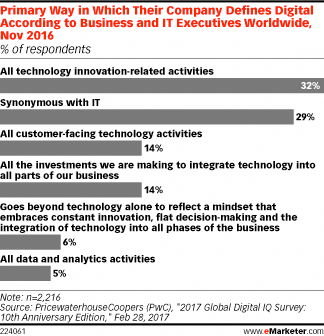What Is Digital Transformation, and What Does It Require? [PODCAST]
May 17, 2017
![]() Most executives agree that a digital transformation is necessary to remain competitive, keep pace with disruptive technologies and evolve with shifting consumer expectations. Still, many are unsure of how to start the process, or even what it entails.
Most executives agree that a digital transformation is necessary to remain competitive, keep pace with disruptive technologies and evolve with shifting consumer expectations. Still, many are unsure of how to start the process, or even what it entails.
eMarketer defines digital transformation as the process by which business leaders harness the capabilities and advances of emerging technologies to digitally reinvent their company’s operations, products, marketing, culture and goals for future growth.
 Technology is the means to transformation, not an end in itself. Instead the focus should be on setting a clear goal for the future, then setting a strategy based on that vision.
Technology is the means to transformation, not an end in itself. Instead the focus should be on setting a clear goal for the future, then setting a strategy based on that vision.
According to eMarketer’s latest report, “Digital Transformation 2017: Disrupting ‘Business as Usual,’” most executives believe that digital transformation is necessary, although it is not always obvious what digital transformation is—or how to approach it.
In fact, many executives can’t even agree on their company’s definition of digital. “If you put 20 [executives] in a room and ask them to define ‘digital,’ you are guaranteed to get 20 different answers,” said Anand Eswaran, corporate vice president of Microsoft Services and Microsoft Digital.
Uncertainty is the theme that Martha Mathers, marketing practice leader at consulting firm CEB, said she sees most from her clients as she works with them to define their digital transformation efforts. “Digital presents so much choice, so much opportunity and such a different way of working that it creates tremendous uncertainty. Most marketing leaders feel overwhelmed by technology … and they’re not sure where to begin.”
November 2016 research from PricewaterhouseCoopers (PwC) also highlighted the discrepancy in companies’ definitions of digital. More than three in 10 business and IT executives said digital refers to all technology innovation-related activities.
Hear more about digital transformation from eMarketer analyst Jillian Ryan in the latest episode of “Behind the Numbers.”
Additionally, 29% of respondents said digital is synonymous with the work of IT, 14% believe digital is about customer-facing technology activities and another 14% said digital refers to all investments the company makes to integrate technology across the business. The only thing clear from this survey is that there is no consensus.
Only 6% of those in the PwC poll said digital “goes beyond technology alone to reflect a mindset that embraces constant innovation, flat decision-making and the integration of technology into all business applications.” Though it was chosen by a small percentage of respondents, this statement is most reflective of how the 20-plus brand and industry experts interviewed for this report define digital transformation.
Greg Verdino, managing partner at content consultancy Verdino & Co., was quick to point out that while businesses have been living in a world of digital disruption for more than two decades, it is in the past several years that organizations have been realizing they need a strategic agenda to keep up with the pace of change.
“Digital transformation forces businesses to not just think about how they leverage technology to do things better, faster, cheaper,” he said. “It is [also] about using technology as a means to an end, to innovate and do something they’ve never done before.”
Courtesy of eMarketer






























